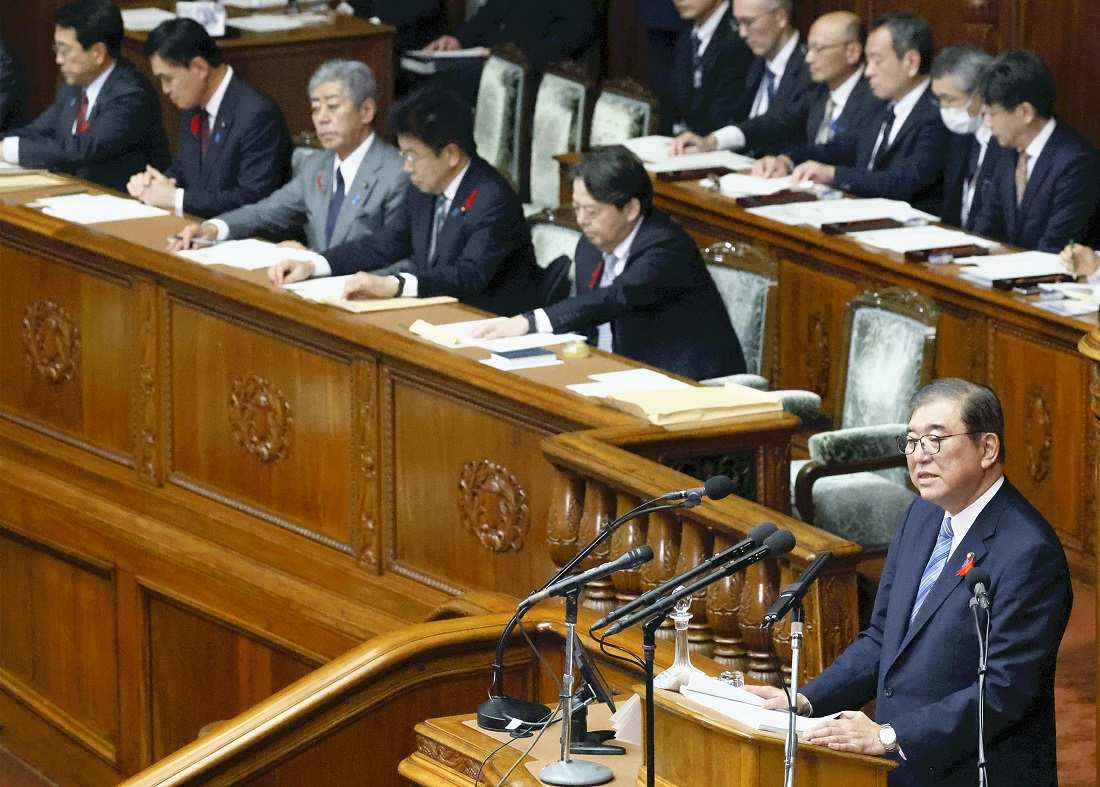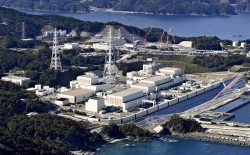Japan PM Ishiba Seems Eager But Fails to Specify Ways to Secure Funding; Some Signature Policies Left Out of Address

Prime Minister Shigeru Ishiba, right, delivers his first policy speech at a plenary session of the House of Representatives on Friday.
16:20 JST, October 5, 2024
Prime Minister Shigeru Ishiba expressed his eagerness to realize high-priority policies such as boosting regional revitalization, creating a disaster management agency and improving the treatment of Self-Defense Forces personnel.
However, he did not go into detail about the review of social security, which accounts for one-third of annual expenditures, or a growth strategy that could produce more tax revenue, leaving the issue of how to secure financial resources unclear.
“Regional areas are the main drivers of growth,” Ishiba said in his first policy speech since becoming prime minister.
“To further support the efforts made in regions nationwide, I will double the amount of subsidies for regional revitalization on an initial budget basis.”
By making the declaration, Ishiba made his stance of prioritizing regional development clear. Regional revitalization has been a lifework of Ishiba, who served as the first minister for regional revitalization and was elected from Tottori Prefecture, which has the smallest population.
If realized, the subsides would be doubled from ¥100 billion to ¥200 billion. Ishiba said he would establish “a headquarters for the creation of new regional economies and living environments” and formulate a basic strategy to be tackled intensively over the next 10 years.
Ishiba also added disaster management onto his list of priority policies. Ishiba said he would proceed with preparations to establish a disaster management agency, a step toward one of his signature policies of forming a disaster management ministry. His idea has been criticized as being unnecessary, but he reportedly felt strongly about including it in his speech.
He also proposed improving evacuation centers, something he repeatedly called for during his Liberal Democratic Party presidential campaign.
On improving the treatment of SDF personnel, Ishiba referred to the establishment of a council comprised of related ministers for the matter that will be headed by himself, showing his seriousness.
However, he did not mention how it would be funded.
Regarding social security, an area for which the budget will inevitably continue to increase, Ishiba only said, “We will not pass the burden on to the next generation” and “We will shift to a social security system that will suit the times.” He did not speak in detail on how the system should be reviewed.
On his economic growth strategy to create more tax revenue, a senior official at the Economy, Trade and Industry Ministry said Ishiba did not present a concrete image and failed to clearly convey his message.
Ishiba’s speech did not mention spending reforms or increasing financial burden, leaving the topic of financial resources untouched.
Some ideas left out
Regarding diplomacy and security, areas Ishiba prides himself as his strengths, he has followed the policies of former Prime Minister Fumio Kishida, as his speech included making the Japan-U.S. alliance a cornerstone and promoting a mutually beneficial strategic relationship with China.
Ishiba left out his ideas of creating an Asian version of NATO, revising the Japan-U.S. Status of Forces Agreement and establishing liaison offices in Tokyo and Pyongyang, all of which he has long advocated.
All these propositions have been met with negative feedback, such as that the ideas are “too difficult to realize,” from both inside and outside the LDP.
Ishiba’s views on constitutional reform include the deletion of Paragraph 2 of Article 9, which prohibits Japan from possessing any war potential. However, during his speech, he only referred to it by calling for relevant discussions at the Commission on the Constitution.
Ishiba, who narrowly won the presidential race, told those around him: “I didn’t win the race with 100% support for my policies. It’s impossible to include all of them.” He confessed that he had no choice but to consider the voices within the LDP.
His speech was about 9,500 words, the longest address by any prime minister since former Prime Minister Shinzo Abe’s second administration.
However, it seemed as if he did not have much time to prepare, as the speech seemed like it was a patchwork of proposals brought forward by various ministries and agencies.
Those within the ruling parties commented positively, saying the speech contained “realistic policies.”
LDP Secretary General Hiroshi Moriyama said: “[Ishiba’s speech] was very powerful. We, as a party, will fully support him so that his policies can be realized.”
On the other hand, Yoshihiko Noda, leader of the Constitutional Democratic Party of Japan, criticized the speech, saying: “It was a patchy policy speech. Rare in modern times.”
Yuichiro Tamaki, leader of the Democratic Party for the People, said: “Ishiba’s character has been completely lost and lacked color. It’s tasteless and dry, like gum that loses its flavor after it has been chewed.”
Related Tags
Top Articles in Politics
-

Japan PM Takaichi’s Cabinet Resigns en Masse
-

Sanae Takaichi Elected 105th Prime Minister of Japan; Keeps All Cabinet Appointees from Previous Term
-

Japan’s Govt to Submit Road Map for Growth Strategy in March, PM Takaichi to Announce in Upcoming Policy Speech
-

LDP Wins Historic Landslide Victory
-

LDP Wins Landslide Victory, Secures Single-party Majority; Ruling Coalition with JIP Poised to Secure Over 300 seats (UPDATE 1)
JN ACCESS RANKING
-

Japan PM Takaichi’s Cabinet Resigns en Masse
-

Japan Institute to Use Domestic Commercial Optical Lattice Clock to Set Japan Standard Time
-

Israeli Ambassador to Japan Speaks about Japan’s Role in the Reconstruction of Gaza
-

Man Infected with Measles Reportedly Dined at Restaurant in Tokyo Station
-

Man Infected with Measles May Have Come in Contact with Many People in Tokyo, Went to Store, Restaurant Around When Symptoms Emerged


















